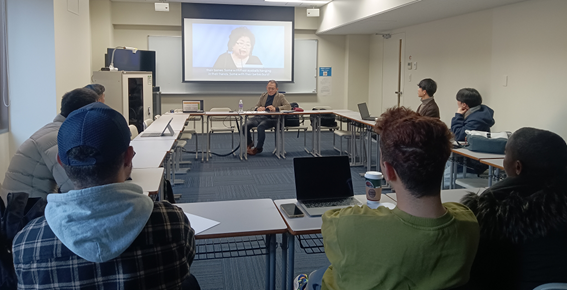Jan 10, 2024
Seven MSDA students participated in a pre-study session for Hiroshima Field Trip led by Mr. Akira Kawasaki on January 9.
OBJECTIVE.

On January 9, 2024, the MSDA organized a study session hosting Mr. Kawasaki, a co-chair of the NGO Peace Boat, as a speaker. The aim of this session was to learn about the history of Hiroshima in the time of atomic age and to prepare the field trip of January 25 to 26.
Mr. Kawasaki started his talk with a brief self-introduction of his career as a peace activist, explaining the activities of Peace Boat and the role that he played in the International Campaign to Abolish Nuclear Weapons (ICAN) International Steering Committee. Then, he introduced a general overview of two atomic bombs dropped on Hiroshima and Nagasaki during the Second World War.
During the lecture, he showed video interviews with female survivors exposed to radiation when they were 13 and 1 years old respectively. Their stories illustrated the life-long destructive effects of atomic bomb. Mr. Kawasaki also introduced statistics about the long-term effects of radiation on human health, such as an increase in the number of people suffering from leukemia, breast cancer, and lung cancer, which emerge and evolve in the course of lifetime. He also mentioned social problems such as discrimination against the survivors.
Mr. Kawasaki emphasizes that Japan is not the sole nation that experienced atomic bombings; from late 20th century to date, approximately 2000 nuclear tests have been carried out in the Pacific Islands, India, Pakistan, and other countries, causing severe human and environmental damages. He also talked about the Treaty on the Prohibition of Nuclear Weapons signed at the United Nations in 2017 and reckoned that this was a great achievement for ICAN toward the realization of a nuclear-free world. During the lecture, students from various countries asked a variety of questions and comments, and many new perspectives were obtained.
Mr. Kawasaki started his talk with a brief self-introduction of his career as a peace activist, explaining the activities of Peace Boat and the role that he played in the International Campaign to Abolish Nuclear Weapons (ICAN) International Steering Committee. Then, he introduced a general overview of two atomic bombs dropped on Hiroshima and Nagasaki during the Second World War.
During the lecture, he showed video interviews with female survivors exposed to radiation when they were 13 and 1 years old respectively. Their stories illustrated the life-long destructive effects of atomic bomb. Mr. Kawasaki also introduced statistics about the long-term effects of radiation on human health, such as an increase in the number of people suffering from leukemia, breast cancer, and lung cancer, which emerge and evolve in the course of lifetime. He also mentioned social problems such as discrimination against the survivors.
Mr. Kawasaki emphasizes that Japan is not the sole nation that experienced atomic bombings; from late 20th century to date, approximately 2000 nuclear tests have been carried out in the Pacific Islands, India, Pakistan, and other countries, causing severe human and environmental damages. He also talked about the Treaty on the Prohibition of Nuclear Weapons signed at the United Nations in 2017 and reckoned that this was a great achievement for ICAN toward the realization of a nuclear-free world. During the lecture, students from various countries asked a variety of questions and comments, and many new perspectives were obtained.


